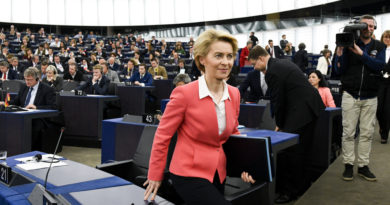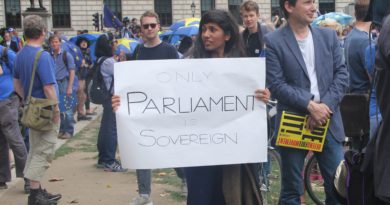What the French election means for the UK
The first round of the French presidential election was won on Sunday by centrist independent candidate Emmanuel Macron (23%) and extreme-right populist Marine Le Pen (21%). The two will now face each other in the second round on May 7. Two other major candidates, the Republican François Fillon and the Socialist Benoit Hamon (with 20 and 6% respectively), have announced they will support Macron, who is expected to win.
Macron campaigned with a strong pro-EU programme and his result was welcomed by several EU leaders, including Michel Barnier, the EU chief Brexit negotiator.
FM @sigmargabriel on #franceelections: I’m glad that @EmmanuelMacron is leading the field. He was the only truly pro-European candidate.
— GermanForeignOffice (@GermanyDiplo) April 23, 2017
Patriote et européen, je ferai confiance le 7 mai à Emmanuel Macron. La France doit rester européenne !
— Michel Barnier (@MichelBarnier) April 23, 2017
It is unusual in Europe to see such comments for a national election, but this was a major test for the European Union and it matters in the upcoming Brexit negotiations. What difference will the new French president make in Brexit talks?
What candidates said about Brexit
Emmanuel Macron said the priority in negotiations will be protecting EU citizens living in the UK. Reuters reports after a meeting with London mayor Sadiq Khan he declared: “The question is not to punish the UK for a vote by the British people. The question on both sides is to organise precisely and smoothly such a decision.”
Visiting London during the electoral campaign, Macron said the rest of the European Union must be preserved, he committed to maintain EU unity in Brexit talks, he called for a re-launch and defense of the single market. He also made clear the best deal for the UK is within the EU and that if Britain wants to keep the so-called “financial passporting” (which allows banks to operate across the EU with only one license), it will have to contribute to the EU budget and guarantee free movement of people.
During his visit, he met the British Prime Minister Theresa May and Chancellor Philip Hammond who, in contrast, did not meet Marine Le Pen.
Macron also invited talented people who are not happy with Brexit (as well as scientists feeling unwelcome under the US Trump administration) to move to France.
Before the EU referendum, when he was still Economy Minister, he declared that “leaving the EU would mean the ‘Guernseyfication’ of the UK, which would then be a little country on the world scale” – as was reported in the Huffington Post.
Marine Le Pen did not articulate her Brexit plans. She shares with Brexit supporters the arguments against the EU. However, these were toned down at the end of the electoral campaign, when she called for a referendum on leaving the euro rather than the EU. With a nationalistic agenda, faced with the Brexit negotiations she is unlikely to support the British cause.
What Brexit and the French vote have in common
Despite their different nature, there are similarities between the French vote last Sunday and the Brexit referendum in June last year.
The first is a deep social crisis to which voters responded abandoning traditional parties. Rather than the usual political lines, the choice was between openness and closure, Europe and nationalism, and fear or hope in the future, noted Jean Quatremer, European correspondent for French paper Libération.
Le choix de société est clair: fermeture/ouverture, Europe/nationalisme, peur du futur/foi dans l’avenir.
— Jean Quatremer (@quatremer) April 23, 2017
The second is the ideological divide between cities and rural areas. The first appear to be more cosmopolitan and supportive of liberal values, the second in search of security and a sense of lost identity. Like London, Paris stood out in France giving 35% of its votes to Macron and 5% to Le Pen, an even more powerful message considering the terrorist attacks suffered by the French capital. French paper La Croix noted that 40% of the votes (those to Le Pen, plus 19% to leftist Jean-Luc Mélenchon) were from angry people, mostly from deprived areas.
Map update: Candidate with most votes in each area. #LePen = purple, #Melenchon = red. 96% local authorities counted. #Presidentielle2017 pic.twitter.com/IhHL1OIoro
— Data Debunk (@data_debunk) April 23, 2017
(Macron got 51.40% of votes by French citizens in the UK, while Le Pen got 2.81%.)
The third is a campaign centered on the European Union, with Macron being the most pro-EU candidate and Le Pen the most opposed to the European project (although Le Monde reports in a TV interview yesterday she said she does not oppose Europe and she feels European). The response of the electorate here seems to be going in opposite direction.
After Sunday’s vote, Italian financier Davide Serra commented on Twitter:
“Populism is king in US and UK. Netherlands and France reject it big time. Germany too. Europe is where populism has lost. Anglosaxon run it.”
Populism is king in US and UK. Netherlands and France reject it big time. Germany too. Europe is where Populism has lost. Anglosaxon run it
— Davide Serra (@davidealgebris) April 23, 2017
The difference they make in Brexit talks
So what does this mean for Brexit? Internally, France and the UK will face similar social issues. France will look for answers in the European Union, the UK outside of it.
Commentators have discussed at length whether the new president will make life for the UK easier or more difficult in the negotiations. What matters the most, however, is the connection the new president will establish with other EU countries. Marine Le Pen is unlikely to have a smooth relation with European leaders. This could undermine the unity European states have maintained towards the UK so far and bring more uncertainty to the Brexit process. The situation will clearly be different with front runner and committed European Macron.
Overall, the elections in the Netherlands, France, the UK and Germany this year, and in Spain last year, meant that key countries are unlikely to hold major votes during the Brexit negotiation period – and this alone will bring more stability.
Claudia Delpero © all rights reserved.
Photo courtesy Pixabay.




